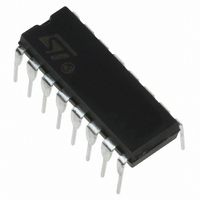ST7FLITE09Y0B6 STMicroelectronics, ST7FLITE09Y0B6 Datasheet - Page 93

ST7FLITE09Y0B6
Manufacturer Part Number
ST7FLITE09Y0B6
Description
MCU 8BIT 1.5KB FLASH 128KB 16DIP
Manufacturer
STMicroelectronics
Series
ST7r
Datasheet
1.ST7FLITES2Y0B6.pdf
(124 pages)
Specifications of ST7FLITE09Y0B6
Core Processor
ST7
Core Size
8-Bit
Speed
8MHz
Connectivity
SPI
Peripherals
Brown-out Detect/Reset, POR, PWM, WDT
Number Of I /o
13
Program Memory Size
1.5KB (1.5K x 8)
Program Memory Type
FLASH
Eeprom Size
128 x 8
Ram Size
128 x 8
Voltage - Supply (vcc/vdd)
2.4 V ~ 5.5 V
Data Converters
A/D 5x8b
Oscillator Type
Internal
Operating Temperature
-40°C ~ 85°C
Package / Case
16-DIP (0.300", 7.62mm)
Processor Series
ST7FLITE0x
Core
ST7
Data Bus Width
8 bit
Data Ram Size
128 B
Interface Type
SPI
Maximum Clock Frequency
8 MHz
Number Of Programmable I/os
13
Number Of Timers
2
Operating Supply Voltage
2.4 V to 5.5 V
Maximum Operating Temperature
+ 85 C
Mounting Style
Through Hole
Development Tools By Supplier
ST7FLIT0-IND/USB, ST7FLIT2-COS/COM, ST7FLITE-SK/RAIS, ST7MDT10-DVP3, ST7MDT10-EMU3, STX-RLINK
Minimum Operating Temperature
- 40 C
On-chip Adc
8 bit
For Use With
497-6250 - BOARD RGB COLOR CTRL STP04CM596497-5858 - EVAL BOARD PLAYBACK ST7FLITE497-5049 - KIT STARTER RAISONANCE ST7FLITE497-5046 - KIT TOOL FOR ST7/UPSD/STR7 MCU
Lead Free Status / RoHS Status
Lead free / RoHS Compliant
Other names
497-5632-5
Available stocks
Company
Part Number
Manufacturer
Quantity
Price
Company:
Part Number:
ST7FLITE09Y0B6
Manufacturer:
Maestro
Quantity:
1 200
Company:
Part Number:
ST7FLITE09Y0B6
Manufacturer:
STMicroelectronics
Quantity:
135
13.7 EMC (ELECTROMAGNETIC COMPATIBILITY) CHARACTERISTICS
Susceptibility tests are performed on a sample ba-
sis during product characterization.
13.7.1 Functional EMS (Electro Magnetic
Susceptibility)
Based on a simple running application on the
product (toggling two -+LEDs through I/O ports),
the product is stressed by two electro magnetic
events until a failure occurs (indicated by the
LEDs).
■
■
A device reset allows normal operations to be re-
sumed. The test results are given in the table be-
low based on the EMS levels and classes defined
in application note AN1709.
13.7.1.1 Designing hardened software to avoid
noise problems
EMC characterization and optimization are per-
formed at component level with a typical applica-
13.7.2 EMI (Electromagnetic interference)
Based on a simple application running on the
product (toggling two LEDs through the I/O ports),
the product is monitored in terms of emission. This
Table 20: EMI emissions
Note:
1. Data based on characterization results, not tested in production.
Symbol
Symbol
ESD: Electro-Static Discharge (positive and
negative) is applied on all pins of the device until
a functional disturbance occurs. This test
conforms with the IEC 1000-4-2 standard.
FTB: A Burst of Fast Transient voltage (positive
and negative) is applied to V
a 100pF capacitor, until a functional disturbance
occurs. This test conforms with the IEC 1000-4-
4 standard.
V
V
S
FESD
FFTB
EMI
Voltage limits to be applied on any I/O pin to induce a
functional disturbance
Fast transient voltage burst limits to be applied
through 100pF on V
tional disturbance
Peak level
Parameter
DD
Parameter
DD
and V
V
SO16 package,
conforming to SAE J 1752/3
and V
DD
DD
=5V, T
pins to induce a func-
SS
Conditions
through
A
=+25°C,
tion environment and simplified MCU software. It
should be noted that good EMC performance is
highly dependent on the user application and the
software in particular.
Therefore it is recommended that the user applies
EMC software optimization and prequalification
tests in relation with the EMC level requested for
his application.
Software recommendations:
The software flowchart must include the manage-
ment of runaway conditions such as:
– Corrupted program counter
– Unexpected reset
– Critical Data corruption (control registers...)
Prequalification trials:
Most of the common failures (unexpected reset
and program counter corruption) can be repro-
duced by manually forcing a low state on the RE-
SET pin or the Oscillator pins for 1 second.
To complete these trials, ESD stress can be ap-
plied directly on the device, over the range of
specification values. When unexpected behaviour
is detected, the software can be hardened to pre-
vent unrecoverable errors occurring (see applica-
tion note AN1015).
emission test is in line with the norm
SAE J 1752/3 which specifies the board and the
loading of each pin.
0.1MHz to 30MHz
30MHz to 130MHz
130MHz to 1GHz
SAE EMI Level
V
conforms to IEC 1000-4-2
V
conforms to IEC 1000-4-4
Frequency Band
DD
DD
=5V, T
=5V, T
Monitored
A
A
=+25°C, f
=+25°C, f
ST7LITE0xY0, ST7LITESxY0
Conditions
OSC
OSC
Max vs. [f
1/4MHz
3.5
27
26
=8MHz
=8MHz
8
OSC
1/8MHz
/f
14
32
28
4
CPU
]
Level/
Class
dBµV
93/124
Unit
2B
3B
-
1














